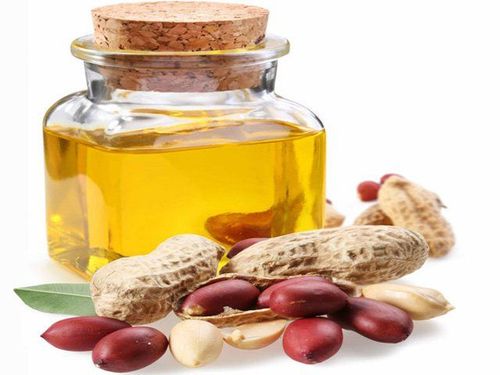This is an automatically translated article.
Today, vegetable fats (vegetable oils) are becoming more and more popular in a healthy diet. This type of fat can have positive effects on health and prevent a number of conditions such as high cholesterol, high blood pressure and other dangerous cardiovascular diseases.
1. What is vegetable fat?
Vegetable fats, also known as vegetable oils, are extracted from plants and are often used for cooking. In addition, vegetable fats are found in some processed foods, such as margarine, salad dressings, mayonnaise, and cookies. The most widely known vegetable oils in everyday food preparation include soybean oil, coconut oil, olive oil and sunflower oil.
Today, refined vegetable oils are being used more and more popularly. They are extracted from plants through a chemical solvent process or using an oil mill. They are then cleaned, purified, or sometimes chemically altered.
The use of vegetable fats along with other fats, such as butter, is increasing rapidly. Studies have shown that the consumption of vegetable oils has many benefits for heart health and is recommended as an alternative to sources of saturated fat, such as lard, butter, and animal fat in general. . This is because vegetable oils contain more polyunsaturated fats, which reduce the risk of cardiovascular diseases than saturated fats.

Chất béo thực vật hay còn được gọi là dầu thực vật được chiết xuất từ các loại thực vật và thường được sử dụng để nấu ăn
2. Nutritional value of vegetable oils
In vegetable oils, they provide many essential nutrients for the body, including tocopherol, unsaturated fatty acids, phosphatids, sterols and other biological compounds.
Unsaturated fatty acids in vegetable oils contain both linolenic acid, linoleic acid and arachidonic acid that the body cannot synthesize on its own, must be supplemented through foods. The following are the different groups of vegetable oils in certain foods:
Vegetable oils containing polyunsaturated fatty acids (about 49 - 50%): Including corn oil, sunflower oil, sesame oil , cotton and soybean oil; Vegetable oils containing mainly oleic acids (from 80% or more): Including peanut oil, olive oil and almond oil; Vegetable oils containing a lot of saturated fatty acids (50%): Including coconut oil and cocoa oil. The following are vegetable oils that provide a variety of nutritional values that are beneficial to overall health, including:
Sesame oils: Like soybean oil, they provide a high concentration of unsaturated fatty acids. In addition, some other nuts such as cashews or chestnuts are also a great source of essential fats and proteins for the body, but their nutritional content is not as much as sesame, peanut and soybean. Peanut oil: Peanuts are a great source of protein, fat, and other important vitamins. Peanut oil also contains a large amount of triglycerides, but little phosphatid. The amount of glycerides present in peanut oil also provides 3 essential fatty acids such as linoleic (80%), oleic and palmitic (10%). The main nutritional values in peanuts usually include: fat (44.5%), protein (27.5%) and glucide (15.5%). Olive Oil: Compared to other vegetable oils, they contain more vitamins and mineral salts. In addition, it also provides a significant amount of vitamin K (60.2mg / 100g), second only to margarine and soybean oil, vitamin E (14.35 mg / 100g) and some other rare minerals such as iron. (0.56mg/100g), calcium (1mg/100g), potassium (1mg/100g) and sodium (2mg/100g). In terms of vitamin content, vegetable oil contains carotene and tocopherol. Vegetable oils that are high in tocopherol include corn oil, soybean oil, wheat bran oil, cotton oil, sunflower oil, and lower olive oils, coconut oils, and peanut oils. On the other hand, vitamin E activity was highest in sunflower oil, whereas soybean and corn oils did not appear to contain vitamin activities.

Lạc là một nguồn thực phẩm cung cấp nhiều protein, chất béo và các loại vitamin quan trọng khác
3. Are vegetable fats good for health?
Overall, a diet with lots of vegetable fats instead of animal oils can provide certain health benefits, especially for people with high blood cholesterol levels. You should use seeds rich in vegetable oils to replace animal fat, including chestnuts, sesame seeds, pumpkin seeds or peanuts. These nuts are rich in polyunsaturated fatty acids, omega 3 and omega 6. To provide an additional source of unsaturated fatty acids, you can also add natural fish oils. In addition, you should also limit your intake of foods that are high in saturated fatty acids, such as butter, fat or meat broth. Some recent studies have shown that the use of vegetable fats can help you reduce your risk of cardiovascular disease, stroke and the risk of premature death from these diseases. Nutritionists recommend that you include healthy sources of polyunsaturated fats like olive oil, seeds and nuts in your diet.
Please dial HOTLINE for more information or register for an appointment HERE. Download MyVinmec app to make appointments faster and to manage your bookings easily.
Reference sources: webmd.com, healthline.com












